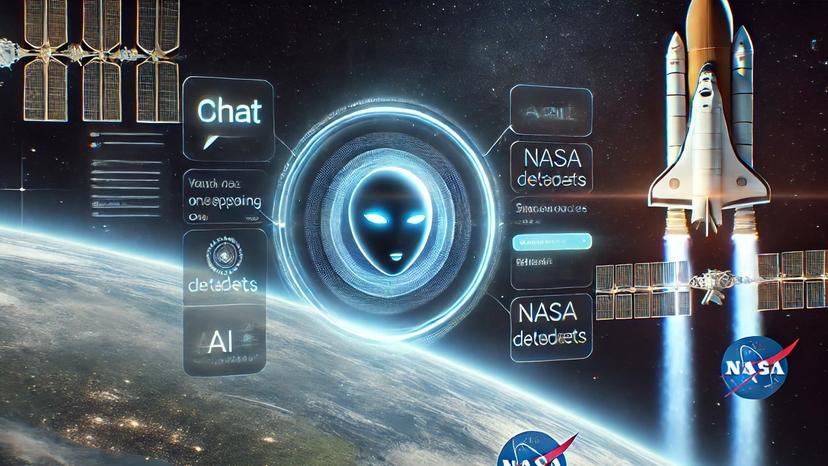
Ayesha Siddiqui@Ayesha_Siddiqui
is under improvement
is under improvement
🤓 Latest Submissions

AI Lawyer Chatbot
AI Lawyer Chatbot is an AI-powered legal assistant that helps users navigate legal documents and receive accurate legal insights. It leverages Groq’s DeepSeek model and Camel AI for intelligent legal reasoning while incorporating a Retrieval-Augmented Generation (RAG) system to provide context-aware responses. Users can upload legal PDFs, ask legal questions, and receive reliable answers based on the extracted document content. The chatbot strictly follows the provided context, ensuring factual and legally relevant responses. With FAISS-based vector search and Hugging Face embeddings, it efficiently retrieves relevant legal text, making legal assistance more accessible, efficient, and user-friendly.
16 Feb 2025

Space Data AI Assistant
The AI-Powered Space Tutor simplifies access to space data for researchers, educators, and enthusiasts. Using Groq API, OpenAI models, NASA datasets, and Tavily search, it delivers AI-driven insights and real-time space exploration knowledge through an intuitive Streamlit UI. A RAG model ensures accurate, context-aware responses, while the FastAPI backend enables seamless interaction. This project democratizes space education, making complex data more accessible and engaging. Technologies Used: Python, FastAPI, Streamlit Tavily Langchain LangGraph Unicorn Groq API (Llama 3), OpenAI (GPT-4o) NASA API, Tavily Search API Local & cloud deployment
9 Feb 2025

A RAG Application for Enhanced Health Diagnostics
This project aims to develop a Retrieval-Augmented Generation (RAG) application designed to predict lung cancer risks using a comprehensive health dataset. The dataset includes critical features such as gender, age, smoking habits, anxiety, chronic diseases, and symptoms like coughing, wheezing, and chest pain. The RAG framework combines a robust retrieval system with generative AI to deliver precise and contextual insights. By analyzing input data, the application predicts the likelihood of lung cancer and provides evidence-based recommendations for early detection and intervention. Built on Groq and deployed via Streamlit, this solution empowers healthcare providers and individuals to make informed decisions.
26 Jan 2025

Paper-Quiz-Generation
It is an innovative Streamlit-powered application designed to revolutionize document handling. It supports multi-format uploads, including PDFs, DOCX, PPTX, and XLSX, and leverages AI for advanced processing tasks like summarization, quiz generation, and content combination. The app provides an intuitive drag-and-drop interface, real-time insights through a responsive UI, and professional PDF export options. Key features include AI-powered summarization for concise content extraction, quiz generation in multiple formats (MCQs, True/False, etc.), and combining documents while maintaining structure and coherence. With a sleek, modern design enhanced by animations, the Smart Document Processor ensures a seamless user experience. It is built on cutting-edge technologies like Python libraries (ReportLab, Pandas) and Groq API for AI integration. This tool is perfect for use cases in hackathons, education, and corporate settings, automating tedious document tasks and saving valuable time. The app’s potential for real-time analytics and future enhancements like cloud integration make it a forward-thinking solution for document management. Whether you are a student, educator, or professional, the Smart Document Processor is tailored to empower you with intelligent automation and robust capabilities.
1 Dec 2024

ChatCinema
ChatCinema is a multifaceted Streamlit application that combines a sophisticated movie information chatbot with advanced data processing and generation capabilities. The project integrates various cutting-edge technologies to create a versatile platform for movie enthusiasts, data scientists, and AI researchers. At its core, ChatCinema features a highly interactive movie chatbot. This chatbot utilizes a CSV file ('Hydra-Movie-Scrape.csv') as its primary data source, containing a wealth of information about various movies. To enable efficient and relevant movie retrieval, the application employs the 'all-MiniLM-L6-v2' sentence transformer model to generate embeddings for movie summaries. These embeddings are then used in conjunction with cosine similarity calculations to find the most relevant movie based on user queries. The chatbot's natural language processing capabilities are powered by the Groq API, specifically using the 'llama3-8b-8192' model. This integration allows for dynamic and context-aware responses to user inquiries. When a user inputs a movie-related query, the system retrieves the most similar movie from its database and uses this information as context for generating a response. The output includes comprehensive movie details such as title, year, summary, genres, IMDB ID, YouTube trailer link, rating, movie poster URL, director, writers, and cast information. Additionally, the chatbot generates relevant dialogues or additional information about the movie using the AI model. A key feature of ChatCinema is its ability to maintain and manage chat history. The application stores conversation logs in Streamlit's session state, allowing for a continuous and contextual chat experience. Users have the option to download their chat history, which is provided as an encrypted CSV file for enhanced privacy and security.
23 Aug 2024


.png&w=640&q=75)







